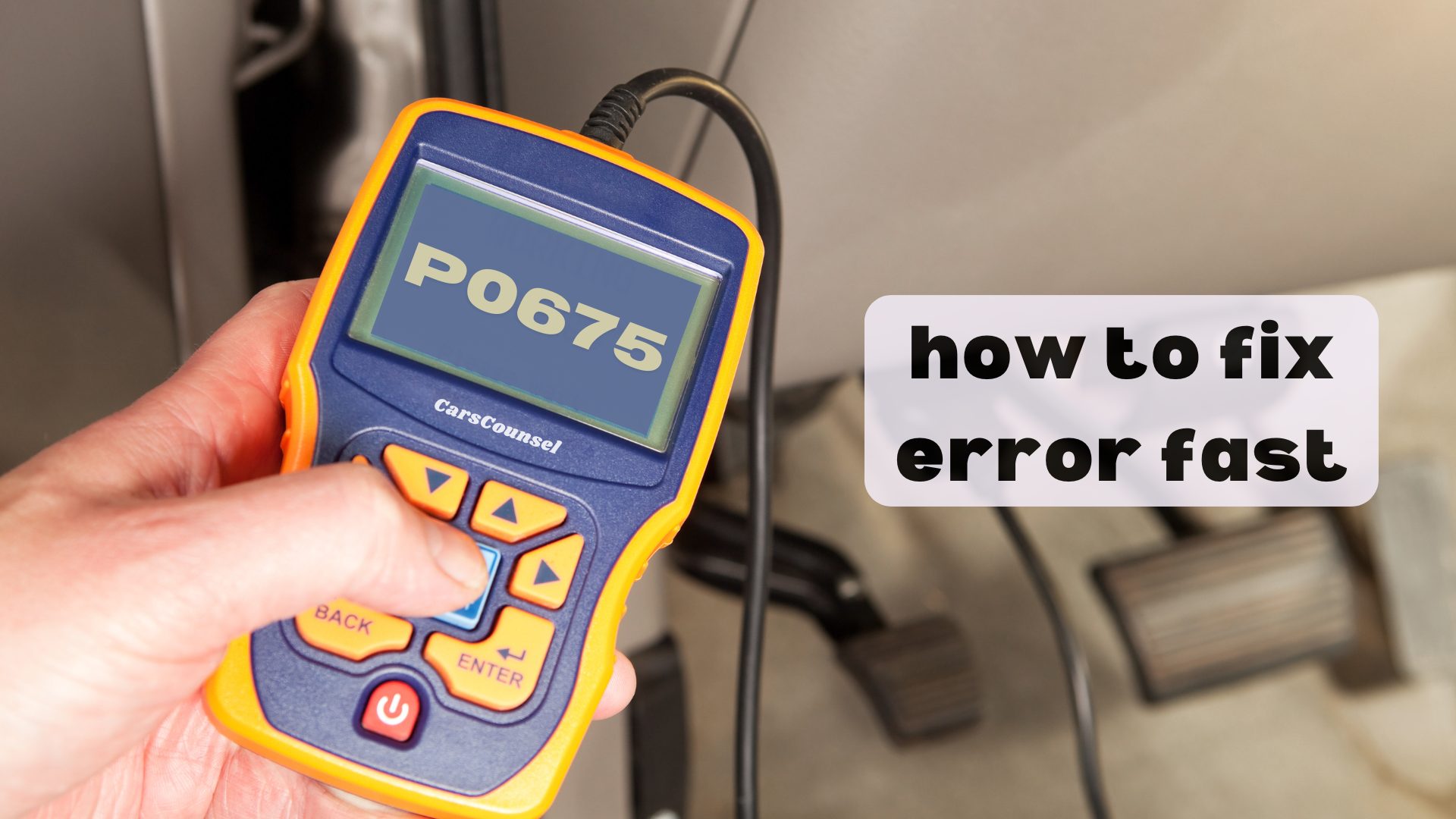When you see a P0675 code, it can feel a bit overwhelming, but fixing it quickly is important for your vehicle’s health. This error code means there’s a problem with the glow plug circuit for cylinder 5. Ignoring it can lead to bigger issues later on.
Start by checking the glow plug control circuit and looking at the glow plugs, wiring, and connectors for any damage or rust. You can use a multimeter to test the resistance and find any bad plugs.
But before you move on, let’s talk about why these parts are so important and how their failure affects your engine’s performance.

Quick Navigation
Key Takeaways
- Check and replace the bad glow plug in cylinder 5.
- Look for any damaged or rusty wires and connectors, and fix them.
- If needed, test and replace the glow plug control module.
- Make sure all connections are tight and secure to avoid future problems.
What Is P0675 Code?
The P0675 code means there’s an issue with the glow plug control circuit for cylinder 5 in your diesel engine. This can affect how well your engine runs, especially when it’s cold outside.
Glow plugs help heat the combustion chamber, so keeping them in good shape is important. If the control circuit fails, you might have trouble starting the engine, experience rough idling, or even have the engine stall. The check engine light will come on, signaling that you need to check things out.
To figure out the problem, use an OBD-II scanner for a precise reading. Look at the wiring, connectors, and the glow plug itself in cylinder 5.
Regular maintenance can help you avoid this issue and keep your diesel engine running smoothly.
Importance of Glow Plugs
Keeping your glow plugs in good shape is crucial for making sure your diesel engine runs well, especially when it’s cold. Glow plugs heat the engine’s combustion chamber, making it easier to start and run smoothly. To keep them reliable, regular maintenance is a must.
Start by checking each glow plug for any signs of wear or damage. Use a multimeter to test their resistance; a bad glow plug will give inconsistent readings. Clean the glow plug connectors and make sure they’re free of corrosion. If you find any bad glow plugs, replace them right away.
Proper maintenance of your glow plugs not only avoids issues like the P0675 code but also boosts fuel efficiency and cuts down on harmful emissions, ensuring your diesel engine runs smoothly.
Common Causes of P0675
Understanding why you got a P0675 code can help you quickly fix the problem in your diesel engine. This code usually points to issues with the glow plug in cylinder 5 or problems in the circuit. Possible causes include a faulty glow plug, damaged wiring, or a bad glow plug control module. Corroded or loose connections can make things worse, especially with environmental factors in play. Circuit issues like short or open circuits can also be to blame.
Here’s a simple breakdown of common causes:
| Cause | Emotional Impact | What to Check |
|---|---|---|
| Faulty Glow Plug | Frustration | Look at the glow plug in cylinder 5 |
| Damaged Wiring | Anxiety | Inspect and fix the connections |
| Control Module Faults | Concern | Test and replace the module if needed |
Figuring out these issues is the first step to solving the P0675 code.
Recognizing Symptoms
If your diesel engine shows the P0675 code, you might see some clear signs that something’s wrong.
Your engine might have trouble starting, especially when it’s cold outside. Once it does start, it might idle roughly or misfire, making the problem worse.
You could also see more exhaust smoke than usual, especially white smoke, which means the engine isn’t burning fuel efficiently. Your fuel mileage might drop because of this.
Don’t ignore the check engine light on your dashboard; it’s telling you to get your engine checked out.
Spotting these signs early can help you avoid bigger problems and keep your diesel engine running well.
Initial Diagnostic Steps
To start figuring out what’s wrong with the P0675 code, first look at the glow plug control module and its wiring for any damage or rust.
Check the connectors and wires closely for any wear, breaks, or rust. This initial check is important because these parts are essential for the glow plug to work properly.
Use simple tools like a flashlight and magnifying glass to see better. Look for any loose connections that could cause problems off and on.
Write down any issues you find, as this will help guide your next steps and make sure you cover all possible causes. This careful inspection is the first step toward accurate diagnosis and effective repairs.
Using an OBD-II Scanner
An OBD-II scanner is a key tool for checking if the P0675 code is present and for collecting detailed information about the issue.
First, make sure your scanner works with OBD-II and is compatible with your vehicle. Plug the scanner into the OBD-II port, usually located under the dashboard. Turn on the ignition and follow the scanner’s instructions to get the diagnostic trouble codes (DTCs).
With the scanner, you can:
- Confirm the P0675 code.
- See live data to watch related system details.
Inspecting Glow Plugs
Start by looking at each glow plug for signs of wear, rust, or damage. Different types of glow plugs, like metal and ceramic, have their own specific traits and common issues.
Check the terminals and body for any cracks or noticeable wear and tear. Use a multimeter to test the resistance; it should match the numbers given by the manufacturer. If the resistance is low or zero, the glow plug is bad.
Regular upkeep includes cleaning the terminals, making sure connections are tight, and replacing glow plugs as recommended. Remember, bad glow plugs can make it hard to start the engine and hurt its performance.
Always handle glow plugs carefully to avoid breaking them during inspection.
Checking Wiring and Connectors
Start by looking over all the wires and connectors tied to the glow plug control circuit for any signs of damage, rust, or wear and tear. Making sure the wires are in good shape and the connectors are clean is crucial.
Keep an eye out for:
- Frayed Wires: Broken insulation can cause short circuits.
- Rusty Connectors: Green or white buildup shows oxidation.
Use a multimeter to check if the wires have continuity and the right voltage. Clean any rusty connectors with electrical contact cleaner and a small brush.
If you spot any damaged wires, mark them for repair. Ensuring these parts are in good condition will help keep the glow plug circuit working properly and avoid more problems.
Repairing or Replacing Components
Once you’ve made sure the wiring and connectors are in good shape, move on to fixing or replacing any broken parts you found during your check.
Start by looking at the glow plug in cylinder 5 to see if it’s working right. If it’s broken, swap it out for a matching part, making sure it’s compatible. Use the right amount of force when installing to avoid damage.
If the glow plug control module is bad, put in a new one according to the manufacturer’s instructions. Also, check the glow plug relay. If it’s not working, replace it to ensure steady power.
Lastly, update the ECM software if needed. Always clear any error codes and take the car for a test drive to make sure the repairs worked.
These steps will keep your engine running at its best.
Preventative Measures
Taking care of your car’s glow plug system can help avoid the P0675 code and keep your vehicle running smoothly. Regular maintenance not only ensures good performance but also saves you from expensive repairs. Make sure to use high-quality parts for better durability.
Here’s what you should do:
- Check Glow Plugs Often: Look for any signs of wear and replace any bad ones right away.
- Look at Wiring and Connections: Check for any damage or rust and fix them as soon as possible.
More OBD-II Codes
Frequently Asked Questions
Can a P0675 Code Affect My Vehicle’s Fuel Economy?
Yes, a P0675 code can hurt your vehicle’s fuel economy. If the glow plug in cylinder 5 is faulty, it can cause poor combustion, which means your car will use more fuel. Fixing this issue quickly can help you get better gas mileage.
How Long Can I Drive With a P0675 Code Before Causing Damage?
You shouldn’t drive for long with a P0675 code. If you keep driving, it could damage your engine. Fix the problem quickly to avoid misfires, stalling, and long-term harm to your engine.
Are There Specific Brands of Glow Plugs Recommended for Preventing P0675?
When it comes to glow plugs, Bosch and NGK are top choices. Regularly checking and replacing your glow plugs can keep your engine running well and help you avoid the P0675 code.
What Tools Are Necessary for Diagnosing a P0675 Code?
To diagnose a P0675 code, you’ll need a diagnostic scanner to confirm the code, an ohmmeter to test the glow plug’s resistance, and basic tools to visually inspect the wiring and connectors. Be thorough to ensure accurate results.
Can Extreme Weather Conditions Trigger a P0675 Error?
Yes, extreme weather can cause a P0675 error by making existing problems worse. Cold weather can affect how well glow plugs work, possibly causing them to fail. On the other hand, very hot weather can damage the control circuit, leading to errors.
Conclusion
To sum it up, fixing the P0675 code quickly means you need to carefully check the glow plug control circuit for cylinder 5. It’s important to take action early to avoid bigger problems later.
Look for any damaged or rusty glow plugs, wiring, and connectors. Use a multimeter to check resistance.
Also, don’t forget to check the glow plug control module and relay. After making repairs, clear the codes with an OBD-II scanner and take a test drive to make sure everything is working properly.
Follow these steps, and you’ll be back on the road in no time.

